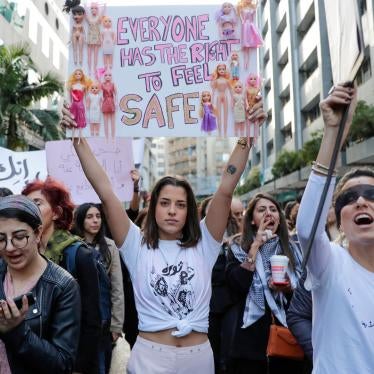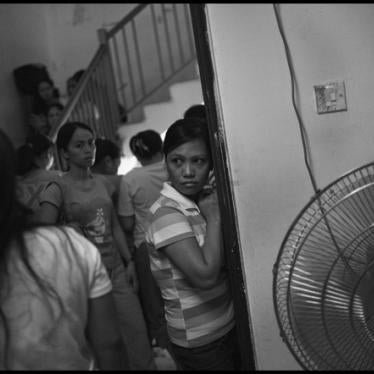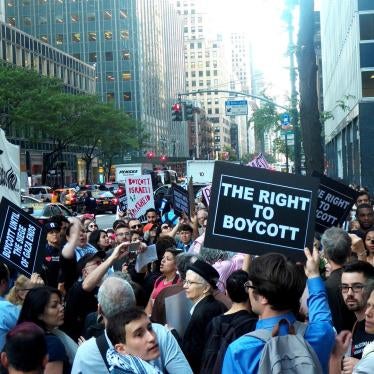“I thought that I can save money. I’m supposed to get free food, accommodation, even call my family for free. Free flights home. Only a babysitter job. Who wouldn’t grab this golden opportunity?”
In December 2012, Sadiyah A. (her real name is withheld for her security) migrated from the Philippines to the United Arab Emirates to work as a babysitter. One year later, she sat before me in Abu Dhabi telling me that the job turned out to be no golden opportunity.
She said she had to do all manner of household work from 5:45 a.m. until midnight, with no rest or day off. She was forbidden from leaving the house except to accompany her employer. Her employer did not provide a SIM card for her to call her family, or let her speak Tagalog to another Filipino worker in the house, or to anyone outside.
After three months, Sadiyah said, her employer stopped paying her, saying she would get her salary when she went home. She finally left the job in October 2013, owed seven months of salary. She was still trying to get her money.
Sadiyah is one of 30,000 Filipino women who migrate to the UAE every year to be domestic workers, according to the Philippine Overseas Employment Administration office. Her experience is not unique.
My colleague and I interviewed 99 domestic workers in the UAE for a new Human Rights Watch report. One after the other, they told us they had not been paid, had no rest periods or time off, were confined to their employers’ homes, and worked up to 21 hours a day. Some were deprived of food and reported psychological, physical, and sexual abuse. In some cases, the abuses amounted to forced labor or trafficking.
The Philippines has laws and policies requiring minimum terms and conditions for their nationals migrating for work overseas. Before leaving the Philippines, Sadiyah said, she signed a contract that promised her an “8-hour-working day, $400 [monthly salary], free accommodation, free food and one day off a week.” But, when she arrived in the UAE, that contract counted for nothing, and she had to sign the standard UAE contract with lesser protections.
Her visa was tied to her “sponsor” employer. Under the UAE’s visa sponsorship (or “kafala”) system, domestic workers cannot leave their employer before the end of their contracts without their consent, trapping many workers in abusive conditions.
The UAE provides no minimum salary. Sadiyah’s employer—a bank manager—put down that Sadiyah would receive only 400 dirhams (about $100) each month, not the $400 the Philippine contract required. When Sadiyah sought help from the UAE’s immigration department, officials only told the employer to pay what the UAE contract said.
The UAE excludes domestic workers from its labor law, denying them basic protections that other migrant workers get, such as overtime pay and limits to working hours. A draft law to protect domestic workers has been pending since 2012.
In June, the UAE authorities revised the standard domestic workers’ labor contract so that it now requires employers to provide a weekly day off and eight hours of rest in every 24. This is an improvement, but the contract is a poor substitute for labor law protections.
UAE authorities then told other countries’ embassies in the UAE that they had to stop verifying their own contract guarantees, which several countries did before they would allow women to migrate to the UAE for domestic work. In response, the Philippines stopped approving visa applications for domestic work, although it did not call it a ban.
But thousands of workers from the Philippines are still in the UAE, without adequate protection, and more will continue to come through other ways. The Philippines’ laws and policies have gradually improved protections for workers, but are simply not sufficient. The Philippine government needs urgently to mobilize, in unison with other labor-sending countries, to insist that the UAE thoroughly reform its unfair and abusive system. This includes allowing domestic workers to change employers without the latter’s consent, and passing legislation to guarantee domestic workers’ rights, in line with the International Labor Organization’s convention on domestic workers.
The Philippines also needs to look more closely at how effective it has been at implementing its own laws and policies for migrant workers. It needs a grassroots campaign to alert prospective migrants to the problems they could face abroad. The Philippines should share information about abusive employers and agents with other embassies and the UAE authorities, and coordinate with UAE authorities to investigate and prosecute cases of forced labor, trafficking, and slavery.
Sadiyah left the Philippines, lured by what she thought was a “golden opportunity,” as many others have before and since. Without serious reforms in the UAE, and in sending countries such as the Philippines, many women will find their dreams shattered, too.









